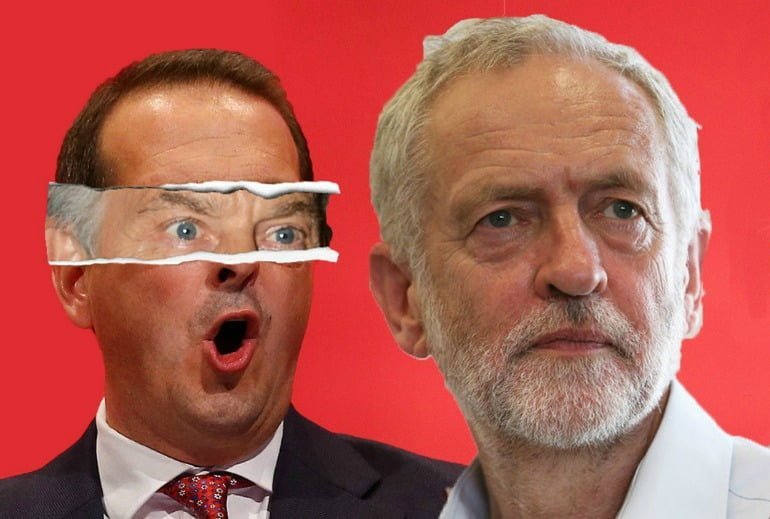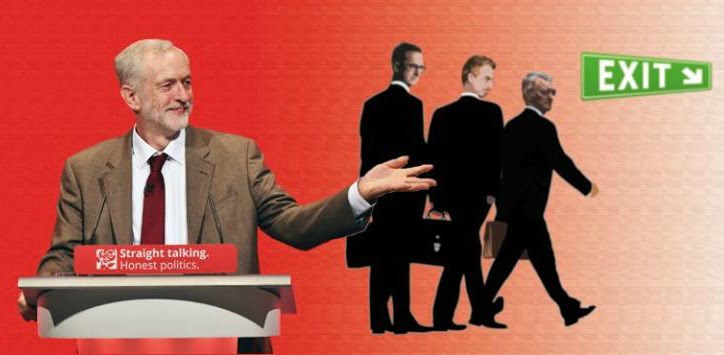With Corbyn now re-elected on an increased majority, the Blairites are openly struggling to see what the way forward is for them and the forces they represent. Step forward the key architect of New Labour himself, Tony Blair, who has hinted that he make a political comeback in order to lead the “moderates” of the “centre-ground”.
Now that the Labour leadership election is over and Owen Smith is back in the box of obscurities from whence he came, the Blairites have started to speak up again. During the election they had kept very quiet, lest their remarks be seen to undermine Smith’s “left” credentials. As it happens, no one was in the least bit fooled by Smith and his “I agree with Jeremy” smokescreen.
With Corbyn now re-elected on an increased majority, the Blairites are openly struggling to see what the way forward is for them and the forces they represent. Step forward the key architect of New Labour himself, Tony Blair.
Blairite zombies
Speaking to that journal of proletarian struggle, Esquire magazine, Blair has stated that the centre ground of politics will “rise again” and that he sees a role for himself in that process. “Where do I go from here? What exactly do I do? That is an open question,” he notes. Indeed.
Correctly he remarks that “there has been a huge reaction against the politics I represent.” However, he is unable to explain or understand just why so many people have rejected this failed system.
Blair talks about a return to British politics and wonders what role he might play. Many will suspect that he is putting himself forward to be the future leader of a new “centre” party, should one be formed out of the rabble of Labour’s right wing. Although many Blairites who were openly talking about this option just a few months ago have pulled back out of fear for their careers, it remains on the cards – if not now, then at a later stage should things not “work out” for them.
The “centre ground”
One question neither Blair nor any of the rest of the Establishment seems keen to answer is: what is the centre ground? They like to use phrases like “moderate” or “middle of the road”, as if that is a good thing to which most people wish to aspire – neither Left nor Right. How nice.
In a polarised political situation, however, the centre ground has no meaning. Evidently both the majority of Labour MPs and the Tory Party now wish to occupy this territory, as do the Lib Dems. This reflects the fact that the “centre ground” as they see it is now well to the right in the political spectrum: support for capitalism, finance and banking; public sector cuts and attacks on benefits; anti-trade union and anti-migrant policies; and so on.
The reality of the Blairites’ political programme will not be missed by the increasing number of people today who see nothing for them in this cosy-sounding “centre ground”. However, the Blairites will nevertheless persist for now with the centre-ground mantra.
Tory-lite
 This orientation is also reflected in the argument from the Blairites that Labour needs to appeal and win over Tory voters… by being more like the Tories. One of the more interesting fringe meetings to take place at the Labour Party conference this year – albeit for reasons not intended by the organisers – was a Fabian Society discussion on Labour’s future. One of the speakers, Kate Green MP (an Owen Smith campaign organiser) indeed stated that, to win the next election, “we need to attract Tory voters back to Labour”.
This orientation is also reflected in the argument from the Blairites that Labour needs to appeal and win over Tory voters… by being more like the Tories. One of the more interesting fringe meetings to take place at the Labour Party conference this year – albeit for reasons not intended by the organisers – was a Fabian Society discussion on Labour’s future. One of the speakers, Kate Green MP (an Owen Smith campaign organiser) indeed stated that, to win the next election, “we need to attract Tory voters back to Labour”.
Also present was the Blairite guru and “special advisor” John McTernan, who started his remarks by saying “I am not a Tory” (although one questioner from the floor demanded some evidence of this, as she find none from his contribution). Bizarrely, McTernan ended up shouting, “Let’s choose London! Let’s choose the Financial Services sector! We shouldn’t get side-lined by fringe issues.” Presumably he did not mean the London of Tower Hamlets, Newham or Brixton, but more likely the boundaries of the Square Mile and the City of London.
The idea that you need to pander to Tory voters and “move to the centre” is one that Labour’s right wing has promoted at election after election. Clearly with little success, if you take into account the defeats of 1970, 1979, 1983 (where the right dominated the campaign, openly deriding the Labour manifesto in public), 1987, 1992 and more recently 2010 and 2015. Labour did win a landslide in 1997, but with a lower vote than in the 1950s, despite having a much larger electorate, gaining a huge trawl of seats mainly due to the massive collapse in the Tory vote. Even then, New Labour under Blair would manage to lose four million votes in just eight years, going from 13,518,167 votes in 1997 to 9,567, 589 votes in 2005. The only reason Labour still had a decent majority in 2005 was that the Tory vote was marooned at 8,784,915 as against 9,600,943 in 1997.
In 2015, just how important was the Tory vote? Labour got 9,347,326 votes and the Tories 11,334,920. The combined vote was just 20,682,246 in a 66.1% turnout from an electorate of 46,425,386. The Tories have done better of course, getting 14,093,007 votes in 1992, for example – but in recent elections their vote has been below that level. In 2015, the Tories took just 36.1% of the vote, accounting for just 24% of the electorate.
The Did-Not-Vote party
Two trends are clear. Firstly, the Tory vote has over recent decades declined, both as a percentage of those who voted and of the total electorate. Secondly, the numbers who did not vote Labour or Tory – and who either voted for another candidate or party, or (more importantly) who did not vote at all – have become sizeable; sizable but ignored by the political experts of the establishment.
Indeed, the Did-Not-Vote party, if you want to call them that, has become a major force. In 1950 they were just 16.1% of the electorate; by 1987 they were 24.7%. In 1992 they fell back to 22.3%, then back up to 28.6% in 1997, 40.1% in 2001, and 38.6% in 2005 before shrinking a bit to 34.9% in 2010 and 33.9% in 2015. Of course, the closeness or otherwise of the various elections was clearly a factor – we all knew who was going to win in 2001 and 2005, whereas the result was not clear in advance in 2010 and 2015. Nevertheless the days of 80% plus turnouts have long gone.
So the question must be asked: which is the more important sector of the electorate to focus on to win elections – the Tory voters, or those who voted elsewhere or not at all? It is the non-voters and non-Tory voters who are the key sections to be won over. These are the people who have not been convinced by the Tory-lite policies of previous Labour campaigns. Many used to vote Labour; others have never voted, seeing no reason to do so.
Complete the Corbyn Revolution!
Of course, in reality the Blairites can see the same set of figures as we can. They know that the few Tory votes which could be won by appealing to their views are minute in comparison to the much larger number of votes available from people who are looking for an alternative to the establishment consensus that dominates Westminster politics.
Indeed, more ex-Tory voters could be won over to Labour by providing a real alternative, rather than just offering a pale imitation of the Tories. The “win over Tory voters” argument is not strategic but political – intended to provide an excuse for breaking with any pretence of being left-wing. The fact that Blair no longer says “centre-left” but just “centre” shows the direction he and the rest of his ilk are moving. They are committed to capitalism and the status quo and see their political careers as being linked by a thousand threads to this; hence the move from offering reforms to only counter-reforms.
It is imperative, therefore, not to be taken in by all this chatter from Blair and the rest – as the old saying goes, if you stand in the middle of the road you’ll get run over. A clear socialist alternative to austerity and war is needed. The large numbers of support for Corbyn in two leadership elections shows that there is a basis within society already for socialist policies.
The fight for such a programme must go hand in hand with the fight to complete the Corbyn revolution: to clear out the right-wing careerists in the Parliamentary Labour Party and replace them with representatives of the working class who are willing to fight for socialism, and not kneel before the Establishment and their rotten system.







